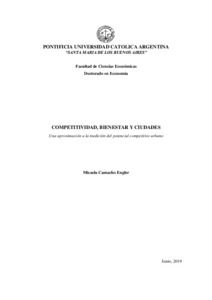Por favor, use este identificador para citar o enlazar este ítem:
https://repositorio.uca.edu.ar/handle/123456789/14667| Título : | Competitividad, bienestar y ciudades. Una aproximación a la medición del potencial competitivo urbano | Autor : | Camacho Engler, Micaela | Director de Tesis: | Horta Berro, Roberto | Palabras clave : | COMPETITIVIDAD; CIUDADES; BIENESTAR | Fecha de publicación : | 2019 | Cita : | Camacho Engler, M. Competitividad, bienestar y ciudades. Una aproximación a la medición del potencial competitivo urbano [en línea]. Tesis Doctoral. Pontificia Universidad Católica Argentina, 2019 Disponible en: https://repositorio.uca.edu.ar/handle/123456789/14667 | Resumen : | Abstract: This dissertation aims to contribute to the study of competitiveness both at the theoretical and at the empirical level, with a specific focus on urban competitiveness. It is structured in three first chapters, each of which elaborates a self-contained research, and a last fourth one that highlights the argumentative thread followed by the previous chapters, compiles the main findings of the previous investigations and constructs some final thoughts on the research as a whole. Thus, this thesis can be read either as one full research or as three separate investigations. The first chapter of this document centers its attention on the definition of the term competitiveness at the territorial level. This is motivated by the lack of agreement regarding the definition or even the appropriateness of the use of concept. Through a thorough revision of the academic literature regarding the matter and the analysis of the different theoretical frameworks, on the first chapter of this thesis, different elements and dimensions of the competitiveness concept are identified and studied, and a specific definition of territorial competitiveness is proposed: “process through which from resources and capacities that provide competitive advantages, a territory can achieve previously established wellbeing objectives”. Given the findings of the first investigation (first chapter), and the proposed definition of territorial competitiveness, the wellbeing concept acquires special relevance. In this sense, and introducing a special focus on cities, the second chapter is concerned with the study of wellbeing creation at the urban level. The third chapter of this thesis is concerned with the measurement of the “competitiveness potential” that is created by “resources and capacities that provide competitive advantages”, as stated by the competitiveness definition previously proposed. Thus, through the construction of a composite indicator, the competitiveness potential of twenty-nine cities is calculated, and different conclusions are drawn from the results comparison. Finally, in the fourth chapter, each of the self-contained investigations of the previous chapters are revisited, highlighting their main findings, the reasoning thread and the final reflections on the matter of competitiveness that could be drawn from this dissertation. | URI : | https://repositorio.uca.edu.ar/handle/123456789/14667 | Disciplina: | ECONOMIA | Derechos: | Acceso abierto |
| Aparece en las colecciones: | Tesis de Doctorado en Economía |
Ficheros en este ítem:
| Fichero | Descripción | Tamaño | Formato | |
|---|---|---|---|---|
| competitividad-bienestar-ciudades.pdf | 2,95 MB | Adobe PDF |  Visualizar/Abrir |
Visualizaciones de página(s)
109
comprobado en 27-abr-2024
Descarga(s)
266
comprobado en 27-abr-2024
Google ScholarTM
Consultar
Este ítem está sujeto a una licencia Creative Commons Licencia Creative Commons

